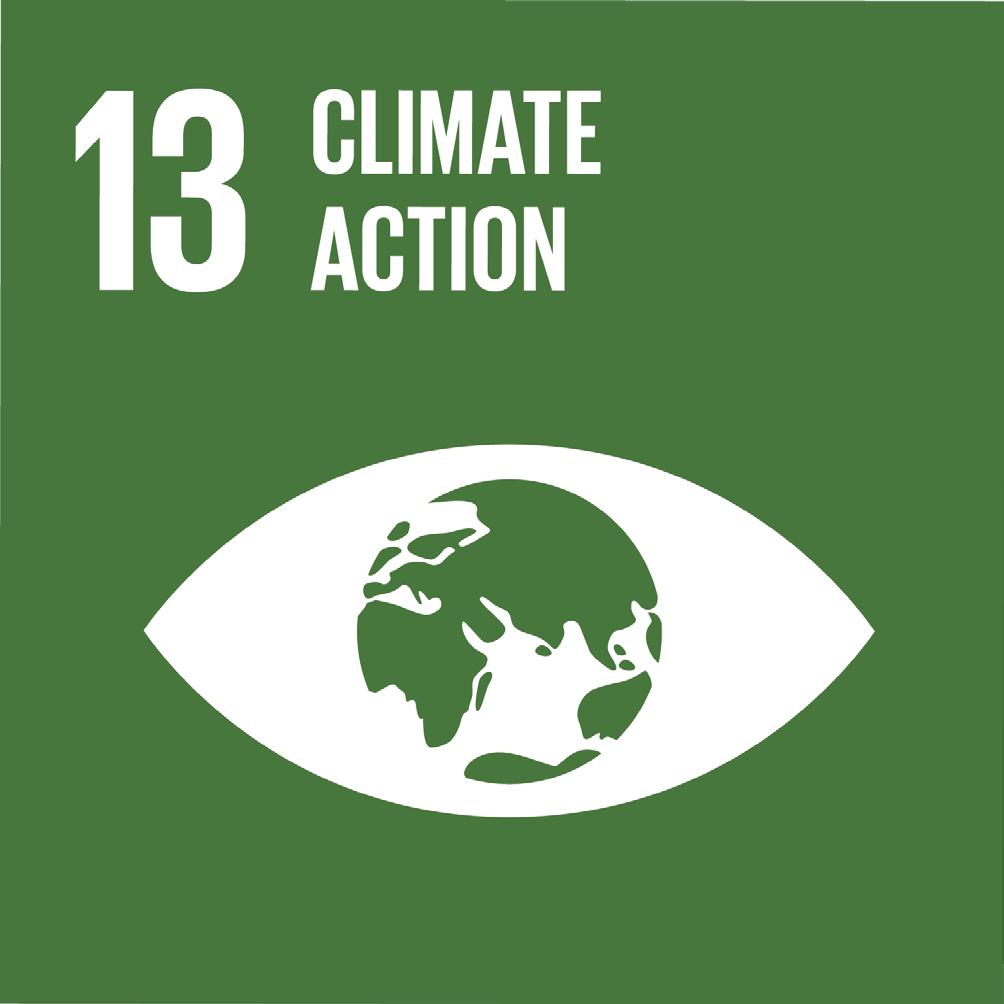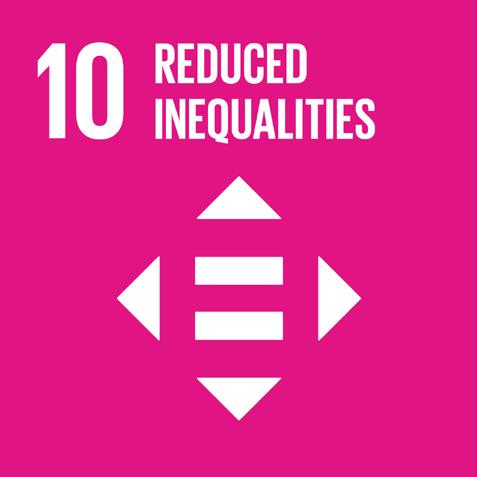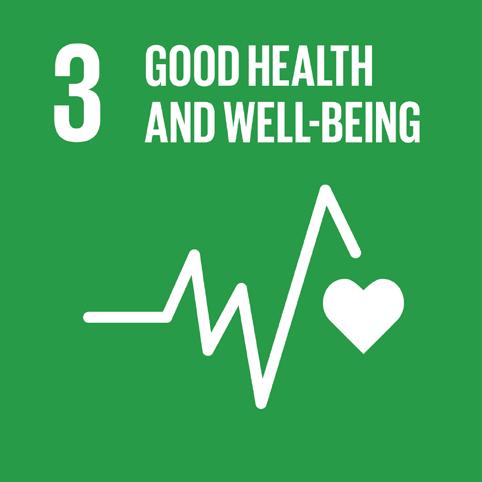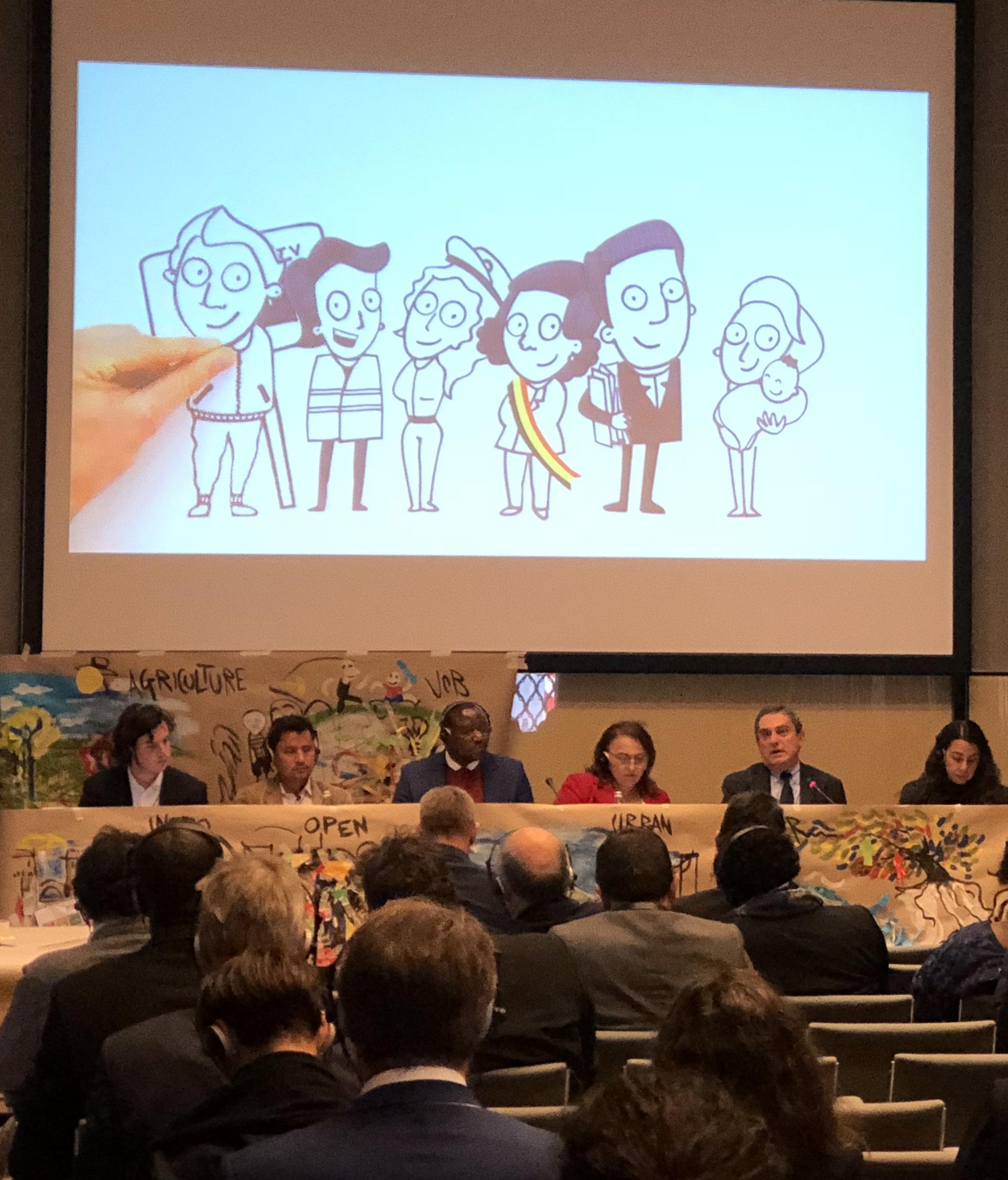
7 minute read
3. Opening welcome
03 OPENING WELCOME
The Institutional welcome was offered by the host of the event, the Italian Association for the Council of European Municipalities and Regions (AICCRE) in the voice of its Secretary General, Carla Rey, who introduced the “Localizing SDG” concept focusing the action of local governments and their communities around 5 key themes: people, planet, prosperity and partnership. In Italy, still 1.778.000 citizens live in absolute poverty and climate change constitutes not a future thread, but rather a present one. Only in the past year, natural disasters have affected 198 Italian municipalities. The world needs to move away from present consumption and production models and start thinking about future generations, who are also in need of decent jobs. Women are still excluded in many countries of the world, and the elder population is at risk. Promoting the SDGs equals promoting peace and good government, human rights, rule of law, freedom and equality access as well as fighting corruption and promoting efficient institutions. Agenda 2030 needs partnerships, cities will be key as 70% of the population will be urban, as urban will be the places of production and consumption. Future investments and innovation need to be centred around people if we want to achieve the SDGs.
Advertisement
Frederic Vallier, Secretary General of CEMR - Council of European Municipalities and Regions, spoke on behalf of Platforma, a European coalition of 30 partners active in decentralized cooperation. He mentioned how Agenda 2030 is the first global public policy devised by United Nations member states, but that also counted with the participation of local governments. Venice City Solutions 2030 fully subscribe the objectives of Platforma to imagine the future of our continent and our cities. Venice is a symbol of one of the main challenges linked to climate change; as it was only two weeks ago that the city was flooded, reminding us how grave the situation is. There is no alternative, either we change our development model or life on planet will be compromised. We need to think about future generations and the
Venice event is essential as it concerns how to finance, therefore, make possible to achieve Agenda 2030.
Emilia Saiz, Secretary General, UCLG - United Cities and Local Governments recognised the importance to start a more structured dialogue between central and local governments; since no single sphere of government can achieve Agenda 2030 by themselves. Local governments are fully committed to the SDGs, as they represent the agenda that the constituency is committed to since long ago. In 2015, in the middle of political, economic and social polarization, two significant events took place: one was the Paris Agreement and the other Agenda 2030, the first universal agenda that affirmed the fact that sustainable development was not a North or South issue, but a global one. The transformations that we need to put in place need to be a joint effort as most of the targets are global targets. Agenda 2030 goes beyond the goals, but constitutes the bases for a new social contract. UCLG, with its 250.000 members around the world, has put Agenda 2030 at the core of its action and is fully committed to work as an ally to make a difference. But we need to make some tough choices regarding finance, this needs to include international development cooperation, that still do not give local governments the sufficient attention as key players of development. We need to start a conversation about how to transform the financial system, changing the legal frameworks and giving local and regional governments access to international finance.
Stefano Bonaccini, President of the Emilia-Romagna Region, Italy, President of AICCRE and President of CEMR thanked the coral effort made by UCLG, AICCRE and the United System to be able to bring together central, local governments and their partners to Venice. Many examples today show the consequences of the impact of natural or human induced disasters in the economy, but also in terms of human casualties. The Region that he presides, Emilia-Romagna is committed to reduce 40% of CO2 emissions by
Welcome
2030, to prevent pollution that many times causes such disasters. We must lose fear about the electoral impact of such courageous measures. We are here to better understand how projects and innovative ideas can be financed, putting local priorities first. Resources are not finite, international development financing institutions need to make difficult decisions about where to invest, but the governance of such institutions is also influenced by central governments. Local and regional government need the support of their national counterparts to influence the way finance is decided, making sure that local development becomes a priority.
The keynote speech was delivered by Mahmoud Mohieldin, Senior Vice President, World Bank Group who started his intervention remembering the experience of the Millennium Development Goals (2000 – 2015) and how many of their successes and failures regarding water and sanitation or poverty reduction happened depending of the capacity of reaction at local level.
Well-managed urbanization can result in better development outcomes, but climate change risks may delay development progress as the number of disasters keeps rising. In this sense, cities are very vulnerable to climate change, but also have a critical role to fight it. The rate of technological advancement is unprecedented, but at the same time the divide between the educated/skilled elite and the less educated keeps growing. Differences are also bigger between declining provincial towns and thriving metropolitan centres and the polarization between rich and poor countries prevails. Managing these challenging trends requires a comprehensive response

in terms of policy change. We need renewed public policies to manage the direction and effects of change. These new policies need to concentrate on a) investing in human capital b) investing in resilience (including social protection) and c) investment in infrastructure. All those investments require, of course to be financed, but we also need data to be able to inform policy decisions. Data is the new oil, is a source for action and information generation.
The World Bank Group is supporting the implementation of the 2030 Agenda at local level. How? By promoting territorial development, building resilience and maximizing finance. A territorial lens allows policies & investments to be better tailored to local endowments and constraints. In order to maximize finance at local level, the World Bank has calculated that the global investment needed for urban infrastructure is about $4.5-5.4 trillion per year, including a 9-27% premium to make this low emission and climate resilient. We are aware than only a very small fraction of this can be supplied by official development assistance. The key components of financing sustainable development are composed by three flows: International and domestic public sector, domestic resources and international cooperation.
To assist cities, expand access to finance we should start by strengthening sound city financing systems: 1. Generating more own source of revenues 2. Increasing fiscal transfers based on a formula (not ad hoc) 3. Improving the accounting and financial management performance of city governments and service delivery agencies 4. Establish regulatory frameworks for facilitating private investment in urban entities and projects.
The World Bank Group is supporting cities and national governments put in place the financial framework to attract investment and grow in a sustainable manner. In East Africa, the World Bank has an operational portfolio of almost $1 billion in urban projects focusing on improving financial and institutional performance in Ethiopia, Kenya, Tanzania, and Uganda. In Morocco, a EUR 172 million

World Bank loan aims to improve the city of Casablanca’s investment capacity by improving its revenue management and attracting private investment to municipal infrastructure and services through publicprivate partnerships.
To provide capital directly to cities for investment in infrastructure, the World Bank current urban portfolio encompasses 180 projects with a commitment value of around $24bn globally. Through the capital raising strategy of the World Bank Cities Resilience Programme, we are helping cities around the world raise the finance they need to build resilience to climate change and disaster risks while the City Creditworthiness Initiative strengthens the financial performance of local governments, and prepare them to tap domestic and regional capital markets without a sovereign guarantee. The initiative has trained over 600 municipal officials from 240 cities in 25 countries.
Unlock social, human, and economic wealth that cities already own but is out of sight – or “hidden”. Understanding the city’s balance sheet to better recognize the long-term consequences of political decisions and make choices that mobilize real returns rather than rely on more taxes, debt, or austerity. Public assets: even poor cities own large swathes of poorly utilized land, or they control underperforming utilities and other commercial assets. Most cities could more than double their investments with smarter use of these commercial assets.











